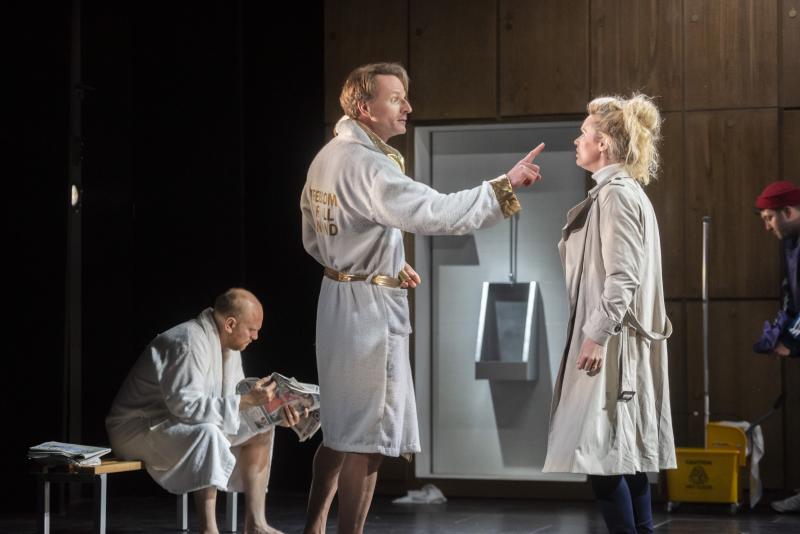Don Giovanni, Longborough Festival Opera review - Mozart in the urinal | reviews, news & interviews
Don Giovanni, Longborough Festival Opera review - Mozart in the urinal
Don Giovanni, Longborough Festival Opera review - Mozart in the urinal
Coarsened, disembowelled and only quite well sung

One of the features of the converted barn that forms the theatre at Longborough is a trio of statues that tops the front pediment of the building: Wagner, flanked by Verdi on the right and Mozart on the left. No one could question Wagner: Longborough has done him proud.
I shall struggle to find anything positive to say about Constantine’s Don Giovanni. Set initially – and for the whole of the first act – in what seem to be the unisex changing rooms of a leisure-centre gym, it proceeds from coarseness to crudity to vulgarity of a kind that frankly made me feel physically ill. After the inevitable Overture pantomime in which a towelled Don indulges in the abduction and rape of a series of female gymnasts, the last of whom turns out to be (Donna) Anna, he then murders the Commendatore in the apparently unconcerned presence of (who turns out to be) Don Ottavio, with, perhaps, a knife-bladed squash racket, pulling out his innards for us all to relish. Elvira then appears, inexplicably, in the men’s urinal, and we have the unique pleasure of watching various walk-on pissers (pissers-by?) to the accompaniment of some of the most sublime music ever penned by man.
Need I go on? There may be an idea behind all this. Perhaps it’s somehow connected with the slogan on the back of Giovanni’s towel-wrap: “Freedom for all mankind” (the libretto’s “Viva la libertà”). Or perhaps not. Perhaps Constantine is satirising the astonishing (and clearly deliberate) tackiness of Will Holt’s designs, all towels and gold knickers and rubber palm trees, though quite why Mozart’s music or even Da Ponte’s witty and subtle text should prompt this kind of Aunt Sallyism escapes me.
 For the second act we’re out of the gym and into a sort of blockboard street, with doors here and there but, for some reason, a couple of cheap armchairs and a table, and bits and pieces left over from the gymnasium ball lying around. Finally the Don entertains himself, and eventually the statue, with a monster take-away dinner. The tacky descends to the merely squalid, and the eye searches in vain for the faintest correlative of the ironic elegance of the score.
For the second act we’re out of the gym and into a sort of blockboard street, with doors here and there but, for some reason, a couple of cheap armchairs and a table, and bits and pieces left over from the gymnasium ball lying around. Finally the Don entertains himself, and eventually the statue, with a monster take-away dinner. The tacky descends to the merely squalid, and the eye searches in vain for the faintest correlative of the ironic elegance of the score.
The ear, it’s true, has a better time of it, though not all the singers relish having to sing this by no means straightforward music in Amanda Holden’s skilful (but irretrievably English) translation. Ivan Ludlow is a strong, vocally virile Don, a commanding presence, but hateful in a vulgarian, #Metoo, rather than Don Juanish kind of way – not of course mostly his fault. Paula Sides (pictured above) is a stylish Donna Anna who would fit well into a more idiomatic setting; Emyr Wyn Jones is a fine, lively buffo-bass Leporello.
But the rest take too much colour from their surroundings here. Claire Egan disappoints as Elvira after her lovely Violetta last year, but that was in Italian. The Zerlina, Llio Evans, is not helped by being promoted from peasant to suburban masseuse, while William Morgan’s Ottavio, a frail enough character in Mozart, becomes a repulsive hypocrite in Constantine, which may be why he loses his profound “Dalla sua pace” but retains (and sings very nicely) the more facile “Il mio tesoro”. Only Lukas Jakobski’s Commendatore breathes the authentically sombre air of the Habsburg graveyard, an episode beyond the Constantine/Holt axis to disembowel.
The conductor, Thomas Blunt, presides over this farrago in, I hope, a spirit of tolerance more than complicity. The orchestral performance on Saturday’s second night still preserved some rough edges. But it was pure silk beside the antics onstage.
Add comment
The future of Arts Journalism
You can stop theartsdesk.com closing!
We urgently need financing to survive. Our fundraising drive has thus far raised £49,000 but we need to reach £100,000 or we will be forced to close. Please contribute here: https://gofund.me/c3f6033d
And if you can forward this information to anyone who might assist, we’d be grateful.

Subscribe to theartsdesk.com
Thank you for continuing to read our work on theartsdesk.com. For unlimited access to every article in its entirety, including our archive of more than 15,000 pieces, we're asking for £5 per month or £40 per year. We feel it's a very good deal, and hope you do too.
To take a subscription now simply click here.
And if you're looking for that extra gift for a friend or family member, why not treat them to a theartsdesk.com gift subscription?
more Opera
 Tosca, Royal Opera review - Ailyn Pérez steps in as the most vivid of divas
Jakub Hrůša’s multicoloured Puccini last night found a soprano to match
Tosca, Royal Opera review - Ailyn Pérez steps in as the most vivid of divas
Jakub Hrůša’s multicoloured Puccini last night found a soprano to match
 Tosca, Welsh National Opera review - a great company reduced to brilliance
The old warhorse made special by the basics
Tosca, Welsh National Opera review - a great company reduced to brilliance
The old warhorse made special by the basics
 BBC Proms: The Marriage of Figaro, Glyndebourne Festival review - merriment and menace
Strong Proms transfer for a robust and affecting show
BBC Proms: The Marriage of Figaro, Glyndebourne Festival review - merriment and menace
Strong Proms transfer for a robust and affecting show
 BBC Proms: Suor Angelica, LSO, Pappano review - earthly passion, heavenly grief
A Sister to remember blesses Puccini's convent tragedy
BBC Proms: Suor Angelica, LSO, Pappano review - earthly passion, heavenly grief
A Sister to remember blesses Puccini's convent tragedy
 Orpheus and Eurydice, Opera Queensland/SCO, Edinburgh International Festival 2025 review - dazzling, but distracting
Eye-popping acrobatics don’t always assist in Gluck’s quest for operatic truth
Orpheus and Eurydice, Opera Queensland/SCO, Edinburgh International Festival 2025 review - dazzling, but distracting
Eye-popping acrobatics don’t always assist in Gluck’s quest for operatic truth
 MARS, Irish National Opera review - silly space oddity with fun stretches
Cast, orchestra and production give Jennifer Walshe’s bold collage their all
MARS, Irish National Opera review - silly space oddity with fun stretches
Cast, orchestra and production give Jennifer Walshe’s bold collage their all
 Káťa Kabanová, Glyndebourne review - emotional concentration in a salle modulable
Janáček superbly done through or in spite of the symbolism
Káťa Kabanová, Glyndebourne review - emotional concentration in a salle modulable
Janáček superbly done through or in spite of the symbolism
 Buxton International Festival 2025 review - a lavish offering of smaller-scale work
Allison Cook stands out in a fascinating integrated double bill of Bernstein and Poulenc
Buxton International Festival 2025 review - a lavish offering of smaller-scale work
Allison Cook stands out in a fascinating integrated double bill of Bernstein and Poulenc
 Tosca, Clonter Opera review - beauty and integrity in miniature
Happy surprises and a convincing interpretation of Puccini for today
Tosca, Clonter Opera review - beauty and integrity in miniature
Happy surprises and a convincing interpretation of Puccini for today
 Hamlet, Buxton International Festival review - how to re-imagine re-imagined Shakespeare
Music comes first in very 19th century, very Romantic, very French operatic creation
Hamlet, Buxton International Festival review - how to re-imagine re-imagined Shakespeare
Music comes first in very 19th century, very Romantic, very French operatic creation
 Falstaff, Glyndebourne review - knockabout and nostalgia in postwar Windsor
A fat knight to remember, and snappy stagecraft, overcome some tedious waits
Falstaff, Glyndebourne review - knockabout and nostalgia in postwar Windsor
A fat knight to remember, and snappy stagecraft, overcome some tedious waits
 Salome, LSO, Pappano, Barbican review - a partnership in a million
Asmik Grigorian is vocal perfection in league with a great conductor and orchestra
Salome, LSO, Pappano, Barbican review - a partnership in a million
Asmik Grigorian is vocal perfection in league with a great conductor and orchestra

Comments
Thanks for this marvellous
I agree with every word of